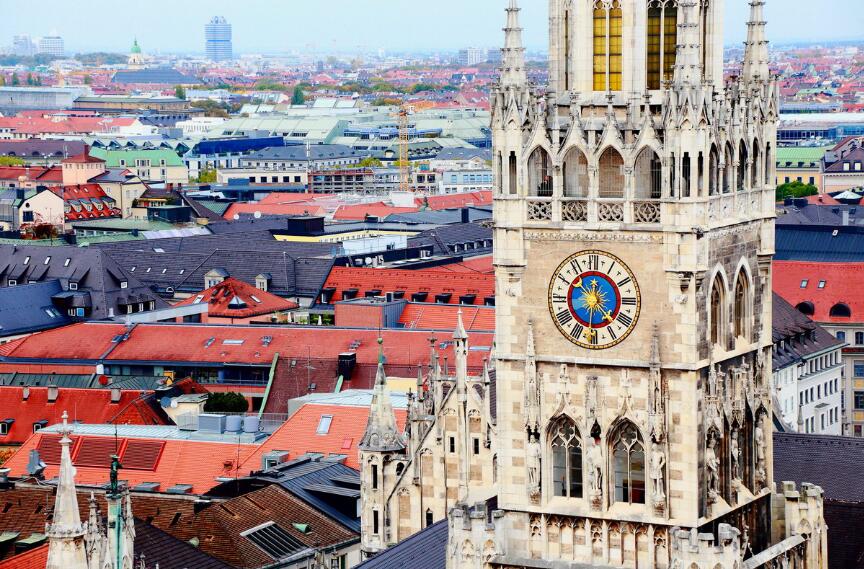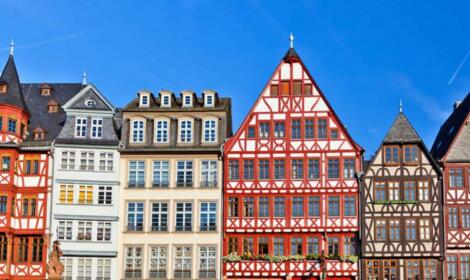QA:德国正在衰落吗?
正文翻译

图

图
评论翻译
Ray Schilling, Blogger, retired physician and cancer researcher. (2010-present)
I was born in Germany, but left the country for Canada in 1972 when I was 27 years old. I have been visiting Germany many times (every 1 to 2 years). I do not see any decline of Germany.
我出生在德国,但在1972年,我27岁时离开德国去了加拿大。我回去过德国很多次(1到2年回一次)。我看不到德国有任何衰落的迹象。
The Euro is stable and Germany was one of the founders of the Euro.
欧盟是稳定的,德国是欧盟的创始人之一。
Together with France Germany is at the forefront of the leading nations of the European unx, keeping it stable.
The German car manufacturers are strong. Mercedes, Porsche, BMW, Audi, Volkswagen and others are selling well in the world. There definitely are challenges with Trump’s tariffs, but I suspect that this will be temporary.
The wine industry produces some of the finest wines that stand up to the worldwide competition.
The chemical and medical industry is going strong in Germany. What Are The Biggest Industries In Germany?
The ship building industry and big machinery like industrial compressors, train engines, trucks etc. are built not only for Germany’s own demands, but also to export to many countries.
与法国一道,德国在欧盟主要国家中名列前茅,保持了欧盟的稳定。
德国汽车制造商实力雄厚。梅赛德斯、保时捷、宝马、奥迪、大众和其他汽车在世界上销售良好。特朗普的关税政策对德国肯定存在挑战,但我怀疑这只是暂时的。
德国葡萄酒行业生产的一些最好的葡萄酒在世界范围内都经得起竞争。
德国的化学和医药工业蓬勃发展。想想德国最大的产业是什么?
造船业和大型机械,如工业压缩机、火车发动机、卡车等,不仅是为了满足德国自身的需求,而且还出口到许多国家。
The tourism industry is strong. Germany is a natural, if you want to see historic sites. Whenever I am going to Germany I take in some of the UNESCO Heritage sites there.
德国旅游业也很强。如果你想看历史古迹,德国是一个你想去的国家。每当我去德国,我都会参观那里的一些联合国教科文组织遗产。
It is true that the former eastern provinces that previously were behind the iron curtain have stayed behind the wealth of the rest of Germany.
诚然,东西德合并前的东部省份一直落后于德国其他地区的富裕程度。
The other problem is that many Germans find it difficult to accept other ethnic population groups (refugees). But in 2 or 3 generations they will adapt to the German culture and Germany can become stronger due to the ethnic diversity. I realize that not everybody will agree with me in that regard.
另一个问题是,许多德国人发现很难接受其他族裔群体(难民)。但在2到3代人的时间里,他们将适应德国文化,德国可以因为种族多样性而变得更加强大。我意识到在这方面不是每个人都同意我的观点。
Here is my answer to your question: “Is Germany in decline?” You can tell from the points I raised that I do not believe that Germany is in decline. We do not know what the future holds. If the recession that is expected as a result of Trump’s tariffs arrives in Europe, things could turn for the worse. But Germany has weathered recessions before and will probably weather even that one. I may have to write an addendum at that time.
以下是我对你的问题的回答:“德国在衰落吗?”你可以从我提出的观点中看出,我不认为德国在衰落。我们不知道未来会怎样。如果特朗普关税带来的后果使欧洲衰退,情况可能会变得更糟。但德国以前经历过衰退,它可能经受得住这场衰退。那时我可能得重新补一份回答。
Ceļotājs Lapukoks, studied at University of Helsinki
Yes.
我的回答是:德国在衰退。
Germany has been the leading civilization in Europe for more than a thousand years. The last attempt to save the nation happened in the 1930s, until Stalin invited a German delegation to Moscow to plan the division of Europe, which soon initiated WW2.
一千多年来,德国一直是欧洲领先的文明。最后一次拯救国家的尝试发生在20世纪30年代,直到斯大林邀请德国代表团到莫斯科计划瓜分欧洲,这很快引发了第二次世界大战。
According to Wikipedia, the largest German population figure for Germany is to be found in 1942. The figure is about 70,8 million. I believe this includes mostly ethnic Germans.
根据维基百科,德国本土人最多的时候在1942年。这一数字约为7080万。我是说“真正的”德国人。
The figure for 1946, just after 4 years, is 64,2 million. In other words, Germany lost 6 million people in holo caustos and other causes.
在四年后的1946年,这个数字是6420万。换句话说,德国在大屠杀和其他原因中损失了600万人。
Holo caustos means “destroying entirely by fire”, and this happened in most German cities, especially in Dresden.
Today, we have a figure 83 million, but, and this is crucial, some 75 % of the population is ethnic Germans. This means that we have about 63 million ethnic Germans left.
大屠杀的意思是“完全用火毁灭一切”,这在大多数德国城市都发生过,尤其是在德累斯顿。
今天,我们的人口数量是8300万,但至关重要的是,只有约75%的人口是德国族裔。这意味着我们还有大约6300万德国人。
Since 1971, Germany has lost more people (deaths) than there have been births. Every single year. 1975 and 2013 were the worst, with over 200,000 more deaths than births.
自1971年以来,德国死亡人数都超过出生人数。每一年。1975年和2013年是最糟糕的,死亡人数超过出生人数20万。
But the births are increasingly non-Germans. You have to look at school classes to see that German children are often a minority.
Germans have traditionally been the most advanced people in Europe (and perhaps in the entire world) in engineering and industries. Today we are seeing decline in both the quality and planning. The new Berlin airport is a good example.
但越来越多的非德国人出生。你必须看看学校的班级,才能发现上学的德国儿童往往是少数族裔。
德国人传统上是欧洲(也许是全世界)工程和工业领域最先进的人。但今天,我们看到的是质量和建设规划都在下降。新柏林机场就是一个很好的例子。
The declining Germany is doing everything, including prison sentence, to erase all symbols of the 1930s, when the population grew rapidly in great optimism. The entire Communist and Capitalist world joined their forces to destroy Germany in the 1940s.
They were successful.
衰落中的德国正在采取一切措施,包括把反对派抓起来,抹去20世纪30年代的所有象征,当时,德国人口以极大的乐观态度迅速增长。整个共产主义和资本主义世界在1940年代联手摧毁了德国(个人观点)。
他们成功了。
The last German alive will say: “at least we were not Nazis”. The sad thing is that they were not anything. Or they will not be anything. Germany is an example of destroying oneself because of nihilism. What they are not, is more important than what they are. As a result, they will not be.
最后一个活着的德国人会说:“至少我们不是纳粹”。可悲的是他们什么都不是。或者他们一事无成。德国是一个因虚无主义而自我毁灭的例子。他们不是什么,比他们是什么更重要。因此,德国没救了。
Jan Schoenmakers, M.A. Communications & Politics, University of Jena (2007)
Nope. Not in relation to the Western World. To the contrary, Germany remains a bulwark of stability and (relative) sanity while around the world seems to go insane. Things in this country just work, and while all the plagues of the West - an over-aging population, growing alienation of the population from the elites, an ever wider gap between the super-rich and everyone else, steeply rising rent & estate prices, controversy over immigration & integration and an overall lack of sustainability - are present, it is in much lower doses and with more benign consequences than in about any other major Western country. For this reason, Germany’s importance and attractiveness are actually increasing.
不。与西方世界其他国家不同。相反,德国仍然是稳定和(相对)理智的堡垒,而全世界似乎都疯了。这个国家的一切都在此中发挥作用,而当影响西方的所有瘟疫——人口过度老龄化、底层人口与精英越来越疏远、超级富豪与其他所有人之间的差距越来越大、租金和房地产价格急剧上涨、移民争议以及整体人口架构缺乏可持续性——都存在时,与任何其他西方大国相比,它这些问题的严重程度要低得多,产生的后果也更为温和。因此,德国的重要性和吸引力实际上正在增加。
However, the West in general is well past its prime and losing its lead to China and Southeast Asia rather fast. Also, Europe in its entirety has completely missed the digitization boat. So there are reasons to sing a swan song to the West that includes Germany, but there is no reason to pick out Germany in particular.
然而,总的来说,西方的时代已经过了鼎盛期,很快就会输给中国和东南亚的领先地位。此外,整个欧洲完全错过了数字化时代。因此,有理由对包括德国在内的西方唱一首挽歌,但没有理由单独把德国挑出来。
Well, nearly no reason: the amount of complacency and inertia in Germany is extraordinary.
嗯,几乎没有理由,因为:德国的自满和惰性是非同寻常的。
Fred Mitchell, lives in Germany
I’ve been living in Germany for the past 5 years — in Berlin, in particular — and decline? I don’t think so.
Now, my anecdotal and cursory observations are based mostly of what I see going on here in Berlin, and may not be reflective of the entire country as a whole.
在过去的5年里,我一直生活在德国,尤其是柏林,我的生活水平下降了吗?我不这么认为。
我的生活琐事和粗略观察大多基于我现在在柏林看到的情况,可能无法反映到整个国家。
I have seen remarkable progress with construction, deployment of Internet infrastructure, greater acceptance of credit cards, more WiFi hotspots, etc. since I arrived 5 years ago.
自从我5年前来到这里以来,德国在建设、部署互联网基础设施、提高信用卡接受度、增加WiFi热点等方面取得了显著进展。
The one negative spot, as I see it, are the recent refugees and migrants that have flocked to Germany. Over a million. Mostly low-skilled illiterates how many even know English, let alone German? I wouldn’t know. But some time back, BAMF posted stats about this migrants, and that is what I am basing my conclusions on with this regard.
在我看来,一个负面因素是最近涌入德国的难民和移民。超过一百万。大部分是低技能文盲,有多少人甚至不懂一点点英语,更不用说德语了?我不知道。但不久前,BAMF发布了关于这些移民的统计数据,这就是我在这方面得出结论的依据。
I think these “refugees” represent a long-term threat to Germany. I would like to be wrong about this. I would like for these refugees to prove me wrong about this. Too many too fast, and are they working? Can they work? Last I heard, no one wants to hire them.
我认为这些“难民”是对德国的长期威胁。希望我在这一点上是错的吧。我想让这些难民证明我错了。来得太多太快了,他们在工作吗?他们能工作吗?据我所知,没有人想雇用他们。
In fact, Germany now has a “return” program, which says it all:
Rückkehr
Or in English:
And their information portal:
Informationsportal zu freiwilliger Rückkehr und Reintegration - Returning from Germany
Need I say more about that?
Overall, I see Germany on the upswing. A most impressive country that I am happy, as a US expat, to become a permanent part of soon, should all goes well. And I do hope that the refugee crisis can be resolved. Seriously.
事实上,德国现在有一个“回归”计划,以下:
Rückkehr
或用英文解释:
以及他们的信息门户:
Informationsportal zu freiwilliger Rückkehr und Reintegration - (德国的归来)
我需要多说一点吗?
总体而言,我认为德国正在崛起。作为一名美国侨民,我很高兴能很快成为这个,我印象最深刻的国家的永久组成部分,如果一切顺利的话。我确实希望难民危机能够得到解决。我是认真的。
Kai Hackemesser, Born in Germany and speaking their language
Germany has an over-aging population. Many people have no savings for the pension age and will receive soon a pension that is at or below benefit levels. There will be a drop in domestic consume that is unavoidable. Germany’s production is export-focused. That means it is very dependent on world economic climate. If the world slips into recession or depression, Germany will sell less and production will shrink. Germany’s companies are not having big liquidity buffers and many took readily loans at low interest rate, to invest or brigde restructuring. These loans will cause them trouble if interest rates would rise in a recession/depression.
德国人口过度老龄化。许多人在退休年龄时没有储蓄,最后就会收到等于或低于福利水平的养老金。国内消费力的下降是不可避免的。德国的生产力以出口为主。这意味着它非常依赖于经济全球化。如果世界其他地方陷入衰退或萧条,德国的销量将减少,产量将萎缩。德国的公司没有很强的缓冲力,许多公司很容易就以低利率获得贷款,用于投资或重组。如果利率在衰退/萧条中上升,这些贷款将给他们带来麻烦。
Deutsche Bank, to mention a real troublesome problem, is stuck deep in a derivatives investment, derivatives are leveraged bets on the financial markets. They were what broke Goldman-Sachs in 2008. This is DB’s situation:
这里提到一个真正棘手的问题,德意志银行深陷于衍生品投资,衍生品是金融市场上的杠杆式押注。2008年,正是他们让高盛破产。这就是德意志银行的情况:
There is a storm coming.
风暴将至。
Oliver Schwarz
Passionately YES, as the <>idea of nation is in decline in most parts of the West and in may details, NO but only in regard to Germany being a strong node in a network of “Western” (we often assume >>universal>>) values and institutions incorporating them, thus also established practices, the socio-economy and so on.
How much Germany is still in Germany? The share of German residents with “migration background” (at least one parent born outside Germany) has grown steadily, to almost exactly 26% at the end of 2019 while the growth of that part of the population has been the lowest since 2011 - amounting to only 2,1%! I have no newer data at hand but the growth of the foreign (passport) population in 2020 is reported as 1,8%, the lowest since 2010, underlining this trend. The other dynamic are birthrates. I improvise: German autochthon population around 1.4 birth per 2 adults, immigrants 2.1 or above.
直白地说,是的,德国在衰落中。因为民族主义在西方趋于下降?不是的,这只是因为德国是“西方”(普世)价值观和制度网络中的一个强大节点,因此也包括既定的政策实施、社会经济等等。
德国还有多少余火?具有“移民背景”(父母至少有一方在德国境外出生)的德国居民比例稳步增长,到2019年底几乎达到26%,而德国总的人口增长率是2011年以来最低的——仅为2.1%!我手头没有最新的数据,但据报道,2020年外国(护照)人口的增长率为1.8%,为2010年以来的最低水平,突显了这一趋势。另一个变幻不定的因素是出生率。我简单阐述下:德国本土人口约为每2名成年人中有1.4人出生,而移民达到2.1人或以上。
Thus, in 2030 around one third of German residents (Germans? - I think you need to ask, poll people about how they define themselves) will live in households/families with at least one member of a markedly “foreign” background. Yes, Alsatian, Belgian, Lux., Dutch, Danish, Polish, Czech, Austrian, Swiss people are seen as very similar but: HOW DO THEY SEE, DEFINE THEMSELVES? German?? Gee - Mom and Dad, you’ve something fancier?! And which language do we speak at home? Doytch? The Russian- and, markedly less, German-speaking immigrant families in the neighborhood tell a long story.
因此,到2030年,大约三分之一的德国居民(德国人?——我想你需要提前问一声,对人们如何定义自己进行民意调查)将生活在至少有一名成员具有明显“外国”背景的家庭中。是的,阿尔萨斯人、比利时人、卢森堡人、荷兰人、丹麦人、波兰人、捷克人、奥地利人和瑞士人都被视为非常相似的人,但是:他们如何看待自己,如何定义自己?德国人?爸爸妈妈们,你们怎么认为的呢?!我们在家里说哪种语言?德儿意儿志儿语?附近的俄语移民家庭和德语移民家庭可有话说了。
Nationhood is unravelling in Central Europe - let me make the point that rightist populists only accelerate the process as their success has a polarizing, divisive effect. Blocking them is a major rallying call among the German juste-millieu, as for the more “progressive” GENDERING or embracing ORIENTALS as emphatically justified in coming to and staying in the country while assimilating badly (An intellectual with East-German and Polish-Jewish roots, Monika Maron, has a good point: Where is the identification with Germany and Germanness? It’s not being nurtured in the public sphere).
中欧的国家认同正在瓦解——让我指出一点,右翼民粹主义者的成功只会加速这一进程,因为他们的成功会产生两极分化的影响。阻止他们当选是德国juste millieu的一个主要口号,因为更“进步”的性别认可或接纳东方人,这是在严重同化的情况下来到和留在德国的明显理由(有东德和波兰犹太血统的知识分子莫妮卡·马龙对此有一个很好的观点:什么是德国,什么是对德国的认同?它不是在大街上培养出来的)。
Thus, we join Belgium in a poorly defined nationhood. Germany as an idea had its run and for 80 odd years tumble to obliviance. Admiral Canaris’ diary note on Sept. 1st 1939 “Finis Germaniae” I find reverberating ever since. “End with Germany.”
I imagine counter-arguments and accusations raining in - but: Which nation HAD to reinvent and LIMIT itself starting in May 1945 in such a radical way? Japan? Canada? The UK? The Kurds? —- Ah, a nation without statehood. A major point, a major point! —- Had the German state, from 1949 we had 3 of them incl. the Austrian Federal Rep. (since when do Austrians identify thoroughly as Non-German?), been terminated for good had the ever-efficient, NO, excuse me DILIGENT administration (yes, we are steeped in V E R W A L T U N G) take orders from a Non-German sovereign: GUTE NACHT. Germany has its SOUL in its state(s). Thus, the EU, having nonetheless Germany as its main pillar from the start (the trick was to acquiesce to French linguacultural hegemony and political bribery of their agricultural folk) sets the terminal stage for this nation. German-speaking Europeans will have been Germans of yonder, many will identify as such: European with German, half of them: also German roots.
Welcome to … priviledging DIVERSITY, non-descence, non-spießigkeit (narrow-minded smugness):
因此,我们与比利时一样,处于一个定义不清的国家认同中。德国这个国家作为一种理念,在80多年的时间里被遗忘了。卡纳里斯上将1939年9月1日的日记“Finis Germaniae”从那以后就一直回响在我的脑海里。“这就是德国的结局。”
我想象着反对我的论点和指责如雨后春笋般涌来——但是:从1945年5月开始,哪个国家必须以如此激进的方式进行自我改造和限制?日本人?加拿大人?英国人?库尔德人?一个不算国家的国家。有一个主要观点,即如果从1949年起,包括奥地利联邦代表在内有三个德国政府存在(从什么时候起,奥地利人就完全被认定为非德国人?),那么一直以来低效、不,请原谅我,“勤勉”的政府(是的,我们沉浸在把国家交给其他人治理)接受非德国君主的命令:晚安。德国的灵魂在于这个国家。因此,尽管如此,欧盟从一开始就以德国为主要支柱(其伎俩是默许法国的语言文化霸权和对其农业人口的政治贿赂)这就为这个国家设定了注定的结局。讲德语的欧洲人就是德国人,许多人会这样认为:欧洲人=德国人,至少其中一半是德国人,或有德国背景。
欢迎来到…注重保护隐私与多样性、无歧视、无监视(与狭隘的自命不凡)的德意志:
The elephant in the room in my German courses (since 2007 - German as foreign language in China/..second language in Germany): Few people there (often I want to say “course population”, as “students” is derived from Latin ‘to strive’ and ‘participants implies also too much) have the intrinsic drive to learn German as innately a language - the communication medium and identifier of a community, thus also part of their identity - which they rather implicitly and collectively reject. Almost always socio-economic reasons command the decision to “learn” German. In China: Access to a college out-of-reach for one’s test results or purse in the case of a more attractive subject choice (German is a “dog of a choice” otherwise) or, in a similar calculation, a way to access German universities. In Germany, my course population is dominated by refugees being obliged to be present in the classroom in the face of public welfare sanctions (Integrationskurs - JobCenter- VHS - Ali Baba - me slowly going mad). The practical things at reach in those courses: test results or welfare money. The results in usable German communication skills and a sustained learning effort is minimal, absolutely minimal, appalling.
德语课程就像屋子里的大象(自2007年起——德语在中国作为外语/第二语言):学德语的人虽然很少(我常想说“学德语的人口”,因为“学生”一词来自拉丁语“努力”,不那么德语化)有内在的动力去学习德语,把它作为一种能说的语言——一种社区的沟通媒介和标识,因此也是他们身份的一部分——而这是他们相当含蓄但集体拒绝的。人们几乎总是出于社会经济原因决定“学习”德语。在中国:如果选择了更具吸引力的科目(德语是“可选科目”),那么德语考试成绩没什么用,将来也赚不到钱,或者类似的,无法进入德国大学进一步深造。在德国,我们学德语的人口主要是难民,他们面对公共福利的压力被迫出现在教室里。在这些课程中,实用的东西是:考试成绩或福利金。在实用的德语沟通技巧和持续的学习努力方面的结果是最小的,绝对是极小的,令人震惊的程度。(即大家根本不想学德语,只是迫于生活或社会压力霸王硬上弓)
Thus I also agree with Mr. Mitchell:
“The one negative spot, as I see it, are the recent refugees and migrants that have flocked to Germany. Over a million. Mostly low-skilled illiterates how many even know English, let alone German? I wouldn’t know. But some time back, BAMF posted stats about this migrants, and that is what I am basing my conclusions on with this regard.”
因此,我也同意Mitchell先生的看法:
在我看来,一个负面因素是最近涌入德国的难民和移民。超过一百万。大部分是低技能文盲,有多少人甚至不懂一点点英语,更不用说德语了?我不知道。但不久前,BAMF发布了关于这些移民的统计数据,这就是我在这方面得出结论的依据。
Fred Mitchell
I agree with you on most points except for the refugee part. The type of refugees that have been allowed into Germany are low-skilled, and many are not even literate in their own languages. Mostly men.
I really don’t see them producing “generations”, because what would all those low-skilled men have to offer German women? Just being realistic here.
So maybe I am completely off-base here, but I am just not seeing anything good coming out of the current set of refugees.
除了难民问题外,我在大多数问题上都同意你的看法。获准进入德国的难民大多数是低技能的人口,许多人甚至不懂自己的语言。大部分是男性。
我真的不觉得他们会在这里产生“一代人”,因为那些低技能的男人能为德国女性提供什么?现实一点吧。
所以,也许我在这里完全不靠谱,但我只是没有看到目前的难民能给我们带来什么好的结果。
I was born in Germany, but left the country for Canada in 1972 when I was 27 years old. I have been visiting Germany many times (every 1 to 2 years). I do not see any decline of Germany.
我出生在德国,但在1972年,我27岁时离开德国去了加拿大。我回去过德国很多次(1到2年回一次)。我看不到德国有任何衰落的迹象。
The Euro is stable and Germany was one of the founders of the Euro.
欧盟是稳定的,德国是欧盟的创始人之一。
Together with France Germany is at the forefront of the leading nations of the European unx, keeping it stable.
The German car manufacturers are strong. Mercedes, Porsche, BMW, Audi, Volkswagen and others are selling well in the world. There definitely are challenges with Trump’s tariffs, but I suspect that this will be temporary.
The wine industry produces some of the finest wines that stand up to the worldwide competition.
The chemical and medical industry is going strong in Germany. What Are The Biggest Industries In Germany?
The ship building industry and big machinery like industrial compressors, train engines, trucks etc. are built not only for Germany’s own demands, but also to export to many countries.
与法国一道,德国在欧盟主要国家中名列前茅,保持了欧盟的稳定。
德国汽车制造商实力雄厚。梅赛德斯、保时捷、宝马、奥迪、大众和其他汽车在世界上销售良好。特朗普的关税政策对德国肯定存在挑战,但我怀疑这只是暂时的。
德国葡萄酒行业生产的一些最好的葡萄酒在世界范围内都经得起竞争。
德国的化学和医药工业蓬勃发展。想想德国最大的产业是什么?
造船业和大型机械,如工业压缩机、火车发动机、卡车等,不仅是为了满足德国自身的需求,而且还出口到许多国家。
The tourism industry is strong. Germany is a natural, if you want to see historic sites. Whenever I am going to Germany I take in some of the UNESCO Heritage sites there.
德国旅游业也很强。如果你想看历史古迹,德国是一个你想去的国家。每当我去德国,我都会参观那里的一些联合国教科文组织遗产。
It is true that the former eastern provinces that previously were behind the iron curtain have stayed behind the wealth of the rest of Germany.
诚然,东西德合并前的东部省份一直落后于德国其他地区的富裕程度。
The other problem is that many Germans find it difficult to accept other ethnic population groups (refugees). But in 2 or 3 generations they will adapt to the German culture and Germany can become stronger due to the ethnic diversity. I realize that not everybody will agree with me in that regard.
另一个问题是,许多德国人发现很难接受其他族裔群体(难民)。但在2到3代人的时间里,他们将适应德国文化,德国可以因为种族多样性而变得更加强大。我意识到在这方面不是每个人都同意我的观点。
Here is my answer to your question: “Is Germany in decline?” You can tell from the points I raised that I do not believe that Germany is in decline. We do not know what the future holds. If the recession that is expected as a result of Trump’s tariffs arrives in Europe, things could turn for the worse. But Germany has weathered recessions before and will probably weather even that one. I may have to write an addendum at that time.
以下是我对你的问题的回答:“德国在衰落吗?”你可以从我提出的观点中看出,我不认为德国在衰落。我们不知道未来会怎样。如果特朗普关税带来的后果使欧洲衰退,情况可能会变得更糟。但德国以前经历过衰退,它可能经受得住这场衰退。那时我可能得重新补一份回答。
Ceļotājs Lapukoks, studied at University of Helsinki
Yes.
我的回答是:德国在衰退。
Germany has been the leading civilization in Europe for more than a thousand years. The last attempt to save the nation happened in the 1930s, until Stalin invited a German delegation to Moscow to plan the division of Europe, which soon initiated WW2.
一千多年来,德国一直是欧洲领先的文明。最后一次拯救国家的尝试发生在20世纪30年代,直到斯大林邀请德国代表团到莫斯科计划瓜分欧洲,这很快引发了第二次世界大战。
According to Wikipedia, the largest German population figure for Germany is to be found in 1942. The figure is about 70,8 million. I believe this includes mostly ethnic Germans.
根据维基百科,德国本土人最多的时候在1942年。这一数字约为7080万。我是说“真正的”德国人。
The figure for 1946, just after 4 years, is 64,2 million. In other words, Germany lost 6 million people in holo caustos and other causes.
在四年后的1946年,这个数字是6420万。换句话说,德国在大屠杀和其他原因中损失了600万人。
Holo caustos means “destroying entirely by fire”, and this happened in most German cities, especially in Dresden.
Today, we have a figure 83 million, but, and this is crucial, some 75 % of the population is ethnic Germans. This means that we have about 63 million ethnic Germans left.
大屠杀的意思是“完全用火毁灭一切”,这在大多数德国城市都发生过,尤其是在德累斯顿。
今天,我们的人口数量是8300万,但至关重要的是,只有约75%的人口是德国族裔。这意味着我们还有大约6300万德国人。
Since 1971, Germany has lost more people (deaths) than there have been births. Every single year. 1975 and 2013 were the worst, with over 200,000 more deaths than births.
自1971年以来,德国死亡人数都超过出生人数。每一年。1975年和2013年是最糟糕的,死亡人数超过出生人数20万。
But the births are increasingly non-Germans. You have to look at school classes to see that German children are often a minority.
Germans have traditionally been the most advanced people in Europe (and perhaps in the entire world) in engineering and industries. Today we are seeing decline in both the quality and planning. The new Berlin airport is a good example.
但越来越多的非德国人出生。你必须看看学校的班级,才能发现上学的德国儿童往往是少数族裔。
德国人传统上是欧洲(也许是全世界)工程和工业领域最先进的人。但今天,我们看到的是质量和建设规划都在下降。新柏林机场就是一个很好的例子。
The declining Germany is doing everything, including prison sentence, to erase all symbols of the 1930s, when the population grew rapidly in great optimism. The entire Communist and Capitalist world joined their forces to destroy Germany in the 1940s.
They were successful.
衰落中的德国正在采取一切措施,包括把反对派抓起来,抹去20世纪30年代的所有象征,当时,德国人口以极大的乐观态度迅速增长。整个共产主义和资本主义世界在1940年代联手摧毁了德国(个人观点)。
他们成功了。
The last German alive will say: “at least we were not Nazis”. The sad thing is that they were not anything. Or they will not be anything. Germany is an example of destroying oneself because of nihilism. What they are not, is more important than what they are. As a result, they will not be.
最后一个活着的德国人会说:“至少我们不是纳粹”。可悲的是他们什么都不是。或者他们一事无成。德国是一个因虚无主义而自我毁灭的例子。他们不是什么,比他们是什么更重要。因此,德国没救了。
Jan Schoenmakers, M.A. Communications & Politics, University of Jena (2007)
Nope. Not in relation to the Western World. To the contrary, Germany remains a bulwark of stability and (relative) sanity while around the world seems to go insane. Things in this country just work, and while all the plagues of the West - an over-aging population, growing alienation of the population from the elites, an ever wider gap between the super-rich and everyone else, steeply rising rent & estate prices, controversy over immigration & integration and an overall lack of sustainability - are present, it is in much lower doses and with more benign consequences than in about any other major Western country. For this reason, Germany’s importance and attractiveness are actually increasing.
不。与西方世界其他国家不同。相反,德国仍然是稳定和(相对)理智的堡垒,而全世界似乎都疯了。这个国家的一切都在此中发挥作用,而当影响西方的所有瘟疫——人口过度老龄化、底层人口与精英越来越疏远、超级富豪与其他所有人之间的差距越来越大、租金和房地产价格急剧上涨、移民争议以及整体人口架构缺乏可持续性——都存在时,与任何其他西方大国相比,它这些问题的严重程度要低得多,产生的后果也更为温和。因此,德国的重要性和吸引力实际上正在增加。
However, the West in general is well past its prime and losing its lead to China and Southeast Asia rather fast. Also, Europe in its entirety has completely missed the digitization boat. So there are reasons to sing a swan song to the West that includes Germany, but there is no reason to pick out Germany in particular.
然而,总的来说,西方的时代已经过了鼎盛期,很快就会输给中国和东南亚的领先地位。此外,整个欧洲完全错过了数字化时代。因此,有理由对包括德国在内的西方唱一首挽歌,但没有理由单独把德国挑出来。
Well, nearly no reason: the amount of complacency and inertia in Germany is extraordinary.
嗯,几乎没有理由,因为:德国的自满和惰性是非同寻常的。
Fred Mitchell, lives in Germany
I’ve been living in Germany for the past 5 years — in Berlin, in particular — and decline? I don’t think so.
Now, my anecdotal and cursory observations are based mostly of what I see going on here in Berlin, and may not be reflective of the entire country as a whole.
在过去的5年里,我一直生活在德国,尤其是柏林,我的生活水平下降了吗?我不这么认为。
我的生活琐事和粗略观察大多基于我现在在柏林看到的情况,可能无法反映到整个国家。
I have seen remarkable progress with construction, deployment of Internet infrastructure, greater acceptance of credit cards, more WiFi hotspots, etc. since I arrived 5 years ago.
自从我5年前来到这里以来,德国在建设、部署互联网基础设施、提高信用卡接受度、增加WiFi热点等方面取得了显著进展。
The one negative spot, as I see it, are the recent refugees and migrants that have flocked to Germany. Over a million. Mostly low-skilled illiterates how many even know English, let alone German? I wouldn’t know. But some time back, BAMF posted stats about this migrants, and that is what I am basing my conclusions on with this regard.
在我看来,一个负面因素是最近涌入德国的难民和移民。超过一百万。大部分是低技能文盲,有多少人甚至不懂一点点英语,更不用说德语了?我不知道。但不久前,BAMF发布了关于这些移民的统计数据,这就是我在这方面得出结论的依据。
I think these “refugees” represent a long-term threat to Germany. I would like to be wrong about this. I would like for these refugees to prove me wrong about this. Too many too fast, and are they working? Can they work? Last I heard, no one wants to hire them.
我认为这些“难民”是对德国的长期威胁。希望我在这一点上是错的吧。我想让这些难民证明我错了。来得太多太快了,他们在工作吗?他们能工作吗?据我所知,没有人想雇用他们。
In fact, Germany now has a “return” program, which says it all:
Rückkehr
Or in English:
And their information portal:
Informationsportal zu freiwilliger Rückkehr und Reintegration - Returning from Germany
Need I say more about that?
Overall, I see Germany on the upswing. A most impressive country that I am happy, as a US expat, to become a permanent part of soon, should all goes well. And I do hope that the refugee crisis can be resolved. Seriously.
事实上,德国现在有一个“回归”计划,以下:
Rückkehr
或用英文解释:
以及他们的信息门户:
Informationsportal zu freiwilliger Rückkehr und Reintegration - (德国的归来)
我需要多说一点吗?
总体而言,我认为德国正在崛起。作为一名美国侨民,我很高兴能很快成为这个,我印象最深刻的国家的永久组成部分,如果一切顺利的话。我确实希望难民危机能够得到解决。我是认真的。
Kai Hackemesser, Born in Germany and speaking their language
Germany has an over-aging population. Many people have no savings for the pension age and will receive soon a pension that is at or below benefit levels. There will be a drop in domestic consume that is unavoidable. Germany’s production is export-focused. That means it is very dependent on world economic climate. If the world slips into recession or depression, Germany will sell less and production will shrink. Germany’s companies are not having big liquidity buffers and many took readily loans at low interest rate, to invest or brigde restructuring. These loans will cause them trouble if interest rates would rise in a recession/depression.
德国人口过度老龄化。许多人在退休年龄时没有储蓄,最后就会收到等于或低于福利水平的养老金。国内消费力的下降是不可避免的。德国的生产力以出口为主。这意味着它非常依赖于经济全球化。如果世界其他地方陷入衰退或萧条,德国的销量将减少,产量将萎缩。德国的公司没有很强的缓冲力,许多公司很容易就以低利率获得贷款,用于投资或重组。如果利率在衰退/萧条中上升,这些贷款将给他们带来麻烦。
Deutsche Bank, to mention a real troublesome problem, is stuck deep in a derivatives investment, derivatives are leveraged bets on the financial markets. They were what broke Goldman-Sachs in 2008. This is DB’s situation:
这里提到一个真正棘手的问题,德意志银行深陷于衍生品投资,衍生品是金融市场上的杠杆式押注。2008年,正是他们让高盛破产。这就是德意志银行的情况:
There is a storm coming.
风暴将至。
Oliver Schwarz
Passionately YES, as the <>idea of nation is in decline in most parts of the West and in may details, NO but only in regard to Germany being a strong node in a network of “Western” (we often assume >>universal>>) values and institutions incorporating them, thus also established practices, the socio-economy and so on.
How much Germany is still in Germany? The share of German residents with “migration background” (at least one parent born outside Germany) has grown steadily, to almost exactly 26% at the end of 2019 while the growth of that part of the population has been the lowest since 2011 - amounting to only 2,1%! I have no newer data at hand but the growth of the foreign (passport) population in 2020 is reported as 1,8%, the lowest since 2010, underlining this trend. The other dynamic are birthrates. I improvise: German autochthon population around 1.4 birth per 2 adults, immigrants 2.1 or above.
直白地说,是的,德国在衰落中。因为民族主义在西方趋于下降?不是的,这只是因为德国是“西方”(普世)价值观和制度网络中的一个强大节点,因此也包括既定的政策实施、社会经济等等。
德国还有多少余火?具有“移民背景”(父母至少有一方在德国境外出生)的德国居民比例稳步增长,到2019年底几乎达到26%,而德国总的人口增长率是2011年以来最低的——仅为2.1%!我手头没有最新的数据,但据报道,2020年外国(护照)人口的增长率为1.8%,为2010年以来的最低水平,突显了这一趋势。另一个变幻不定的因素是出生率。我简单阐述下:德国本土人口约为每2名成年人中有1.4人出生,而移民达到2.1人或以上。
Thus, in 2030 around one third of German residents (Germans? - I think you need to ask, poll people about how they define themselves) will live in households/families with at least one member of a markedly “foreign” background. Yes, Alsatian, Belgian, Lux., Dutch, Danish, Polish, Czech, Austrian, Swiss people are seen as very similar but: HOW DO THEY SEE, DEFINE THEMSELVES? German?? Gee - Mom and Dad, you’ve something fancier?! And which language do we speak at home? Doytch? The Russian- and, markedly less, German-speaking immigrant families in the neighborhood tell a long story.
因此,到2030年,大约三分之一的德国居民(德国人?——我想你需要提前问一声,对人们如何定义自己进行民意调查)将生活在至少有一名成员具有明显“外国”背景的家庭中。是的,阿尔萨斯人、比利时人、卢森堡人、荷兰人、丹麦人、波兰人、捷克人、奥地利人和瑞士人都被视为非常相似的人,但是:他们如何看待自己,如何定义自己?德国人?爸爸妈妈们,你们怎么认为的呢?!我们在家里说哪种语言?德儿意儿志儿语?附近的俄语移民家庭和德语移民家庭可有话说了。
Nationhood is unravelling in Central Europe - let me make the point that rightist populists only accelerate the process as their success has a polarizing, divisive effect. Blocking them is a major rallying call among the German juste-millieu, as for the more “progressive” GENDERING or embracing ORIENTALS as emphatically justified in coming to and staying in the country while assimilating badly (An intellectual with East-German and Polish-Jewish roots, Monika Maron, has a good point: Where is the identification with Germany and Germanness? It’s not being nurtured in the public sphere).
中欧的国家认同正在瓦解——让我指出一点,右翼民粹主义者的成功只会加速这一进程,因为他们的成功会产生两极分化的影响。阻止他们当选是德国juste millieu的一个主要口号,因为更“进步”的性别认可或接纳东方人,这是在严重同化的情况下来到和留在德国的明显理由(有东德和波兰犹太血统的知识分子莫妮卡·马龙对此有一个很好的观点:什么是德国,什么是对德国的认同?它不是在大街上培养出来的)。
Thus, we join Belgium in a poorly defined nationhood. Germany as an idea had its run and for 80 odd years tumble to obliviance. Admiral Canaris’ diary note on Sept. 1st 1939 “Finis Germaniae” I find reverberating ever since. “End with Germany.”
I imagine counter-arguments and accusations raining in - but: Which nation HAD to reinvent and LIMIT itself starting in May 1945 in such a radical way? Japan? Canada? The UK? The Kurds? —- Ah, a nation without statehood. A major point, a major point! —- Had the German state, from 1949 we had 3 of them incl. the Austrian Federal Rep. (since when do Austrians identify thoroughly as Non-German?), been terminated for good had the ever-efficient, NO, excuse me DILIGENT administration (yes, we are steeped in V E R W A L T U N G) take orders from a Non-German sovereign: GUTE NACHT. Germany has its SOUL in its state(s). Thus, the EU, having nonetheless Germany as its main pillar from the start (the trick was to acquiesce to French linguacultural hegemony and political bribery of their agricultural folk) sets the terminal stage for this nation. German-speaking Europeans will have been Germans of yonder, many will identify as such: European with German, half of them: also German roots.
Welcome to … priviledging DIVERSITY, non-descence, non-spießigkeit (narrow-minded smugness):
因此,我们与比利时一样,处于一个定义不清的国家认同中。德国这个国家作为一种理念,在80多年的时间里被遗忘了。卡纳里斯上将1939年9月1日的日记“Finis Germaniae”从那以后就一直回响在我的脑海里。“这就是德国的结局。”
我想象着反对我的论点和指责如雨后春笋般涌来——但是:从1945年5月开始,哪个国家必须以如此激进的方式进行自我改造和限制?日本人?加拿大人?英国人?库尔德人?一个不算国家的国家。有一个主要观点,即如果从1949年起,包括奥地利联邦代表在内有三个德国政府存在(从什么时候起,奥地利人就完全被认定为非德国人?),那么一直以来低效、不,请原谅我,“勤勉”的政府(是的,我们沉浸在把国家交给其他人治理)接受非德国君主的命令:晚安。德国的灵魂在于这个国家。因此,尽管如此,欧盟从一开始就以德国为主要支柱(其伎俩是默许法国的语言文化霸权和对其农业人口的政治贿赂)这就为这个国家设定了注定的结局。讲德语的欧洲人就是德国人,许多人会这样认为:欧洲人=德国人,至少其中一半是德国人,或有德国背景。
欢迎来到…注重保护隐私与多样性、无歧视、无监视(与狭隘的自命不凡)的德意志:
The elephant in the room in my German courses (since 2007 - German as foreign language in China/..second language in Germany): Few people there (often I want to say “course population”, as “students” is derived from Latin ‘to strive’ and ‘participants implies also too much) have the intrinsic drive to learn German as innately a language - the communication medium and identifier of a community, thus also part of their identity - which they rather implicitly and collectively reject. Almost always socio-economic reasons command the decision to “learn” German. In China: Access to a college out-of-reach for one’s test results or purse in the case of a more attractive subject choice (German is a “dog of a choice” otherwise) or, in a similar calculation, a way to access German universities. In Germany, my course population is dominated by refugees being obliged to be present in the classroom in the face of public welfare sanctions (Integrationskurs - JobCenter- VHS - Ali Baba - me slowly going mad). The practical things at reach in those courses: test results or welfare money. The results in usable German communication skills and a sustained learning effort is minimal, absolutely minimal, appalling.
德语课程就像屋子里的大象(自2007年起——德语在中国作为外语/第二语言):学德语的人虽然很少(我常想说“学德语的人口”,因为“学生”一词来自拉丁语“努力”,不那么德语化)有内在的动力去学习德语,把它作为一种能说的语言——一种社区的沟通媒介和标识,因此也是他们身份的一部分——而这是他们相当含蓄但集体拒绝的。人们几乎总是出于社会经济原因决定“学习”德语。在中国:如果选择了更具吸引力的科目(德语是“可选科目”),那么德语考试成绩没什么用,将来也赚不到钱,或者类似的,无法进入德国大学进一步深造。在德国,我们学德语的人口主要是难民,他们面对公共福利的压力被迫出现在教室里。在这些课程中,实用的东西是:考试成绩或福利金。在实用的德语沟通技巧和持续的学习努力方面的结果是最小的,绝对是极小的,令人震惊的程度。(即大家根本不想学德语,只是迫于生活或社会压力霸王硬上弓)
Thus I also agree with Mr. Mitchell:
“The one negative spot, as I see it, are the recent refugees and migrants that have flocked to Germany. Over a million. Mostly low-skilled illiterates how many even know English, let alone German? I wouldn’t know. But some time back, BAMF posted stats about this migrants, and that is what I am basing my conclusions on with this regard.”
因此,我也同意Mitchell先生的看法:
在我看来,一个负面因素是最近涌入德国的难民和移民。超过一百万。大部分是低技能文盲,有多少人甚至不懂一点点英语,更不用说德语了?我不知道。但不久前,BAMF发布了关于这些移民的统计数据,这就是我在这方面得出结论的依据。
Fred Mitchell
I agree with you on most points except for the refugee part. The type of refugees that have been allowed into Germany are low-skilled, and many are not even literate in their own languages. Mostly men.
I really don’t see them producing “generations”, because what would all those low-skilled men have to offer German women? Just being realistic here.
So maybe I am completely off-base here, but I am just not seeing anything good coming out of the current set of refugees.
除了难民问题外,我在大多数问题上都同意你的看法。获准进入德国的难民大多数是低技能的人口,许多人甚至不懂自己的语言。大部分是男性。
我真的不觉得他们会在这里产生“一代人”,因为那些低技能的男人能为德国女性提供什么?现实一点吧。
所以,也许我在这里完全不靠谱,但我只是没有看到目前的难民能给我们带来什么好的结果。










